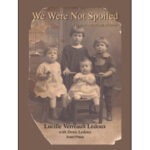We'd love to have you access this content. It's in our members-only area, but you're in luck: becoming a member is easy and it's free.
Already a Member?
Not a Member Yet?
Point of View In a Memoir Is Important. I recently completed my mother’s memoir, We Were not Spoiled. It was a work of love that took me many years to bring to closure as I had other work to do to support myself that filled my days. Finally, she got to be quite a bit […]
This is the first of several articles on point of view in a memoir.
My mother’s memoir, We Were not Spoiled, was a work of love that took me many years to bring to closure as I had other work to do to support myself that filled my days. Finally, she got to be quite a bit older, and beginning to feel urgency as many people do when in my position, I put the push on finishing her story.
I’ll be sharing with you in the next few blog entries my experience of writing someone else’s memoir. My mother was, after all, another person with her own agenda and experience. As the co-writer, my task was to listen to her and to write as close to her point of view as possible. How does one remain faithful to another’s point of view in a memoir?
An early decision was to choose what person I would write this story in: first or third? What are the differences? Did I have a choice?
1. The first person point of view (narrator) affords more intimacy.
Since the reader is hearing an “I” speak, the reader is less likely to doubt the veracity of the story. There is after all no apparent dissidence between the narrator who is the witness providing the account and the protagonist who is the subject to whom the story has happened. If anyone should know what happened and how to portray what happened, it should be this character/narrator called “I.” However, as the ghost…
Knowing my mother as I do, I knew she was not a particularly reflective person. While my father would have asked himself why things happened to him and how he might have been an active player in what happened, my mother would more likely say, “Hey, that’s life. (C’est la vie!) You get up and continue doing your best.” A great attitude for being happy—and my mother was perhaps happier in her life than my father was in his—but not great for a memoir that has any pretension to insight, to unraveling causality, to discovering a chain leading into the present.
Technically speaking, when we are dealing with a ghostwriter, the first person in a co-authored story could be presumed to be the ghostwriter speaking, but there is a conceit that it isn’t the ghostwriter. The conceit has it that every word in the story is the subject’s.
The reader does not want to be disabused—and that’s to the great benefit of the ghost who never wants to be (or shouldn’t want to be if s/he is worth anything) in the forefront. So the ghost agrees to not be the voice of the “I” and the reader agrees to believe that the “I” is the subject of the memoir.
The problem was I wanted the memoir to have her say some things she was no longer able to say—or might not have said without much prompting. So, we were back to point of view.
2. The third-person narrator usually has less intimacy.
With the third person used as a vehicle for the subject of the memoir, the reader does not feel at the center of the subject’s consciousness. As such, the third person underlines the role of the ghostwriter. No subject—interviewee—refers to him/herself in the third person after all. In addition, we the readers ask: who is this person who is writing about “him” and “her?” Therein lies the clear distinction between the author and the subject in the third-person memoir. Another word then for a third-person memoir is “biography.” So, a right choice of point of view in a memoir is crucial
Have you written someone else’s memoir? Did you write it in the first or the third person? Why did you make your choice? Was that ok with the subject? What did you learn about point of view in a memoir?
I hope you will come back to read my next blog entry wherein I write about making use of my ghost’s “I” as if it were my mother’s.
Read the blog excerpts of We Were Not Spoiled [tagged under My Mother’s Stories] or get your own copy of the book which is available from our site store in pdf e-reader or as a paperback.
Part 2 of this series—Point of View in a Memoir— can be found by clicking here.
—
Want a big boost learning how to be a better memoir writer? Invest in yourself. Invest in the Memoir Start Up Package.


No comments yet.